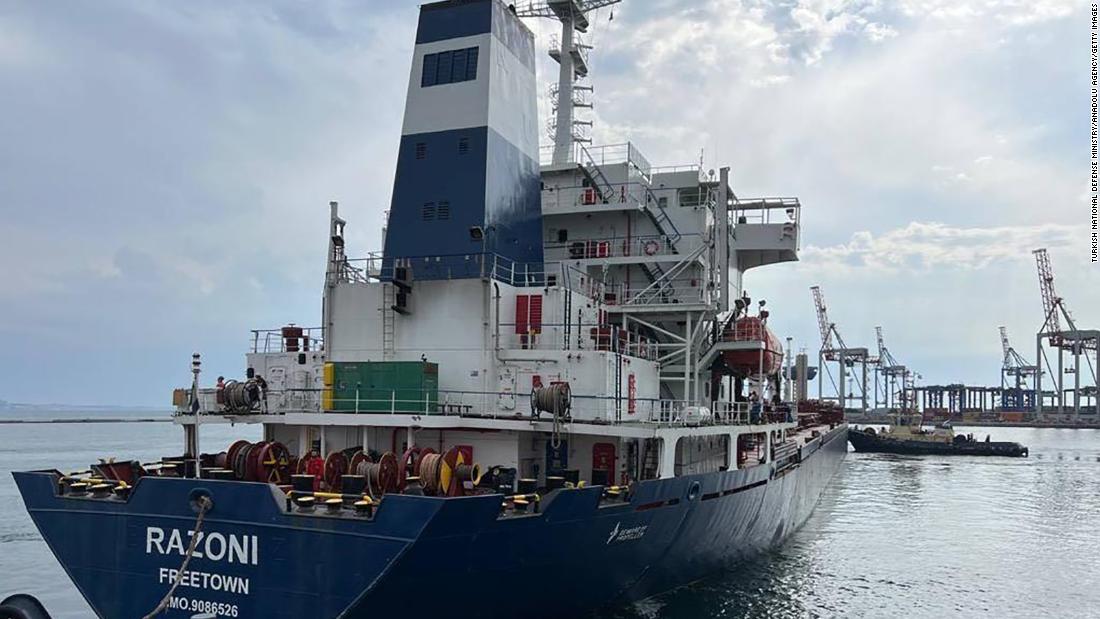
The M/V Razoni became the first commercial vessel to leave the crucial Black Sea port since February 26, two days after Russia launched its assault on Ukraine.
It is bound for the port of Tripoli, Lebanon, and is carrying a cargo of around 26,500 metric tonnes (more than 29,000 US tons) of corn, the United Nations said.
The journey comes after a breakthrough agreement, brokered by the UN and Turkey and signed by representatives from Russia and Ukraine in July, which facilitates the resumption of vital grain exports. Some 20 million metric tons of wheat and corn have been trapped at the port of Odesa, the US Agency for International Development (USAID) administrator Samantha Power said last week.
Ukrainian Foreign Minister Dmytro Kuleba described Monday as a “day of relief for the world, especially for our friends in the Middle East, Asia, and Africa.”
Under the terms of the deal, the ship will anchor off the coast of Istanbul at around 3 p.m. local time (8 a.m. ET) on Tuesday, where it will be inspected before proceeding to its final destination.
Since the first days of the war, Ukraine’s southern ports had been blocked by Russia, denying Ukrainian grain from traveling to the many countries that rely on it.
Senior Western diplomats have responded with cautious optimism following Monday’s departure, welcoming the resumption of grain exports but urging Russia to stick to the deal.
“This is such an important step but it is a first step,” the British ambassador to Kyiv, Melinda Simmons, tweeted on Monday. “[Russia] now needs to honour their side of this deal and let grain ships pass safely. And they need to stop burning and appropriating [Ukrainian] grain.”
“The world will be watching for continued implementation of this agreement to feed people around the world with millions of tons of trapped Ukrainian grain,” the US Embassy in Kyiv added.
Kremlin spokesman Dmitry Peskov told journalists on Monday that the shipment departing was “very positive.”
“It’s a good opportunity to test the effectiveness of the mechanisms that were agreed upon during the Istanbul talks,” he said.
No additional grain shipments are expected to depart Ukraine’s Black Sea ports on Monday, the Joint Coordination Centre (JCC) in Istanbul has said. The JCC will oversee the export of Ukrainian grain. According to the center, dates and timings for further shipments are still being worked out and will likely only be finalized once the first shipment goes through inspection in Istanbul on Tuesday.
Ukraine and Russia are both significant suppliers of food to the world. In normal times, Ukraine would export around three-quarters of the grain it produces. According to data from the European Commission, about 90% of these exports were shipped by sea, from the Black Sea ports.
The UN is hoping that under the deal, a monthly export of 5 million US tons of grain would leave the ports each month, a figure comparable to pre-war levels.
But despite the optimism surrounding the agreement, the Russian invasion has still significantly hit Ukraine’s harvest.
Last month, Ukraine’s grain traders’ union said it expected a grain and oilseed harvest of 69.4 million tons, marginally higher than previous forecasts but far below the 106 million tons harvested last year.
